- Homepage
- Our green garden
- Food Prices in South Africa
Food prices in South Africa
Food prices in South Africa trend ever upwards cry the headlines.
“So my mind was filled with wonder, when the evening headlines read, Richard Cory went home last night and put a bullet through his head.” Simon and Garfunkel wrote some profound and disturbing lyrics. We need no further reminder of the deceit of riches. How could the banker’s only son commit suicide?
Oh the orgies on his yacht and the great blessings of a solid job, even if it is poorly paid in one of Richard Cory’s factories. Listen to the lyric on YouTube.
More recently the evening headlines have been screaming that food prices are trending ever upwards. The price of diesel and electricity are also soaring; and now to add to the pain the world is at war. A quarter of the global wheat harvest is grown in the Ukraine and Russia; jointly they were expected to export a significant slice, 16 million tonnes in the next four months to South Africa.
And Canada experienced drought last summer, normally supplying 12% of the global export harvest; their wheat crop dropped by 39 percent. We can expect a sharp rise in the price of flour and all baked goods in the not too distant future.
Wheat directly from the farmer
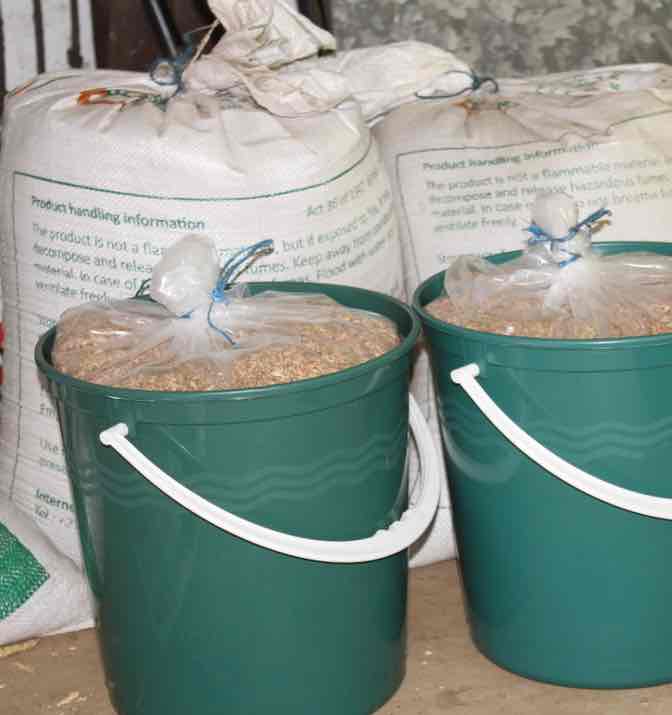 Wheat bought directly from the farmer
Wheat bought directly from the farmerSo what should we make of the oft heard cry, “I just can’t afford to eat healthily; it is too expensive?” Does it hold water? Many of us must be wondering how we are going to feed the family, especially if we are one of the 50% of South Africans without a formal job.
Personally we own what I suppose might be called an “urban farm.” Truth be told though, the mountain of food grown in our garden comes from perhaps a little over half an acre; about 2000m2. Trending amongst greenies is to dig out some of the lawn. That’s a double win; less grass to mow and more space for veggies.
Would it break your heart whilst sipping tea on the verandah to look out on a sea of food?
It would be impossible to measure accurately the value of the food from our green garden. Every day we pick a few lettuce leaves here, a handful of beans there and a basketful of granadillas; lemons too and climb a ladder for yet more avocados.
Add to that a green mealie a day for three months and a continuous supply of fruit through the year. We have oranges, limes and many kinds of berries; cherry guavas and tree tomatoes too, for example.
We almost never buy fruit; perhaps a watermelon and a few mangoes for a treat, yet have plenty all year round. The gooseberry bushes are a wonder.
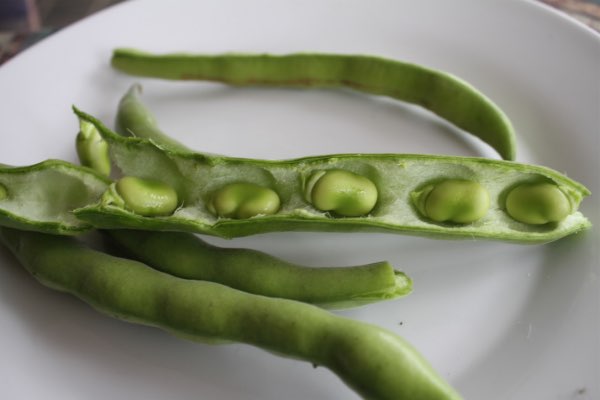
So what do we buy? All of our dairy products and perhaps once a month organic meat is purchased from Reko Hilton. Olive oil is quite a large expense; and onions.
Whole grains in 50kg bags from ‘berg farmers and raw olives straight from the Karoo are ridiculously inexpensive; compared to the ultra-refined flour and mealiemeal from the supermarket, we eat like royalty.
A few vegetables that we cannot easily grow in our
misty, cool climate like tomatoes and brinjals are more difficult.
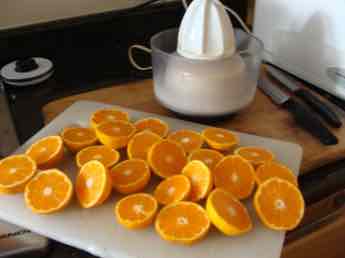
And what do we grow? 650 bottles of premium honey, at least 1000 avocados and hundreds of naartjes are produced every year; more than enough berries in season and plentiful greens of every description.
Can we keep bees in the garden?
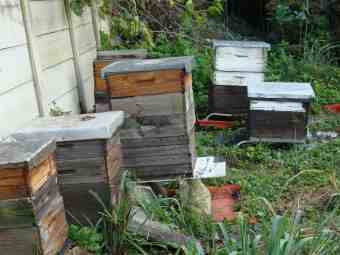
Over 500 granadillas, four different kinds of beans flourish year-round and many pockets of potatoes; citrus, cucumbers and different types of squash. Then there are pumpkins and butternut; far more than we can eat.
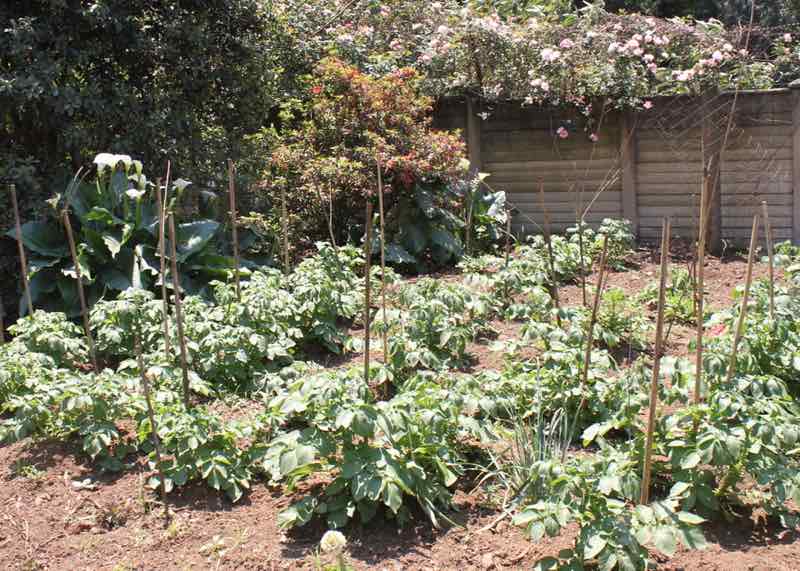 Grow your own potatoes
Grow your own potatoesWhat I can promise you is the retail value of this mountain of food is substantial; well in excess of R100,000 per annum. Add to that wonderful sourdough bread made with 100% flour at six rand a loaf and our own mead for booze.
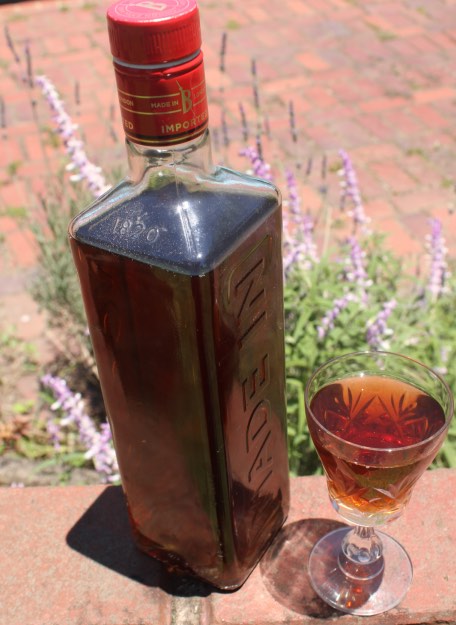 Mulberry mead
Mulberry meadA mealie a day is other source of whole grains for about four months in the summer; and whilst it will puzzle those who advocate the ketogenic diets, we do not put on an ounce. We are convinced that it is the refined carbs that are public enemy, number-one.
Whole grains are difficult to come by; this fried bulgur wheat with turmeric is a faithful member of our menu plans. It's so easy to make. The spice is a powerful anti-inflammatory.
A question mark remains over our fowls; they provide a huge amount of organic fertiliser for our garden and provide us with eggs and meat. But I am a bad chicken farmer. I can and do lop off their heads but with great difficulty. And my wife is a racist; a tongue in cheek story about her love of white meat only.
We have many aged hens that are long past their lop-time but I don’t have the heart. And they can do a lot of damage to your seedlings and greens especially. The free range eggs and meat at Reko are becoming ever more attractive.
True wholemeal bread in five minutes
It takes just five minutes to mill the wheat and prepare the dough for this artisan loaf; if you have a bread machine.
100% wholemeal flour simply is not to be found. You have it to mill it yourself. But then with a sourdough loaf for less than half a dollar all the hardware is soon paid off.
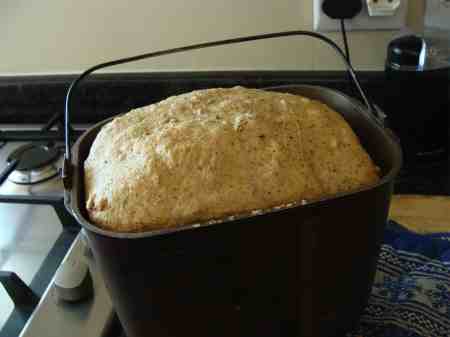 True sourdough wholemeal loaf
True sourdough wholemeal loafWhere do avocados come from?
Where should you start? Where your heart is I always say; but my suggestion is an avocado tree. We planted a new Hass three years ago; I’ve just counted 75 fruit on it. You do the arithmetic.
Avocados originate from Central America; along with the olive the very best of healthy fats.
Then I would certainly have kale, spinach and several kinds of lettuce. Chives are easy as are various legumes; peas and broad beans in March, regular climbers and limas in spring.
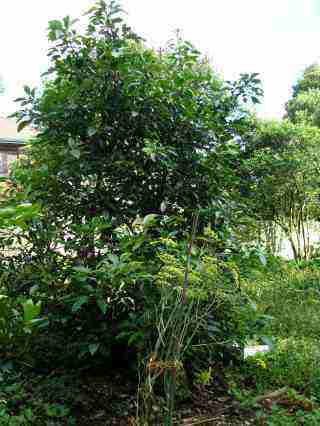 Pinkerton avocado tree is a prolific bearer
Pinkerton avocado tree is a prolific bearerAre peppers easy to grow?
Oh how could I forget the peppadews just beginning to turn bright red? You too could enjoy bucketfuls of them; they are so easy to rear but they do have a long growing season.
Remember too these are top notch organic foods, fresh from your own garden and very difficult to buy; grown with no inorganic fertiliser or toxic sprays; the only meaningful input cost is the sweat off your brow and that’s unaffected by inflation and wars.
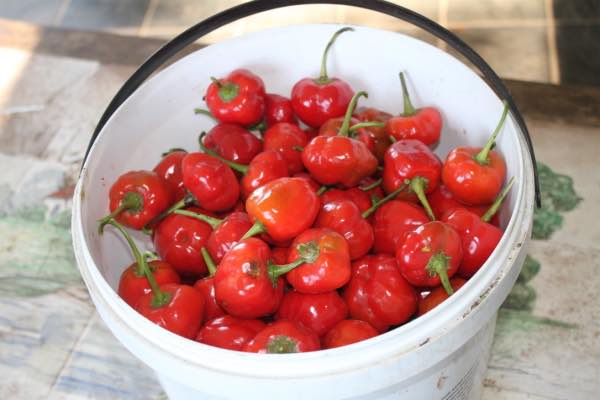
Peppers are the second richest source of vitamin C after citrus; and just as important a phytonutrient called capsaicin that is central in the management and prevention of prostate cancer.
Harvest and store the rain
The biggest cost undoubtedly is water; I’ve written many times of the virtues of an underground reservoir to harvest and store the rain. Without that much of this would not be possible. It took two weeks to dig the hole, lay a slab and brick it up; plaster and roof.
Pristine free water year round is hugely important for the organic farmer; and for home use in this plastic polluted environment. And yes obviously we do spend some money on seeds; mostly we save our own.
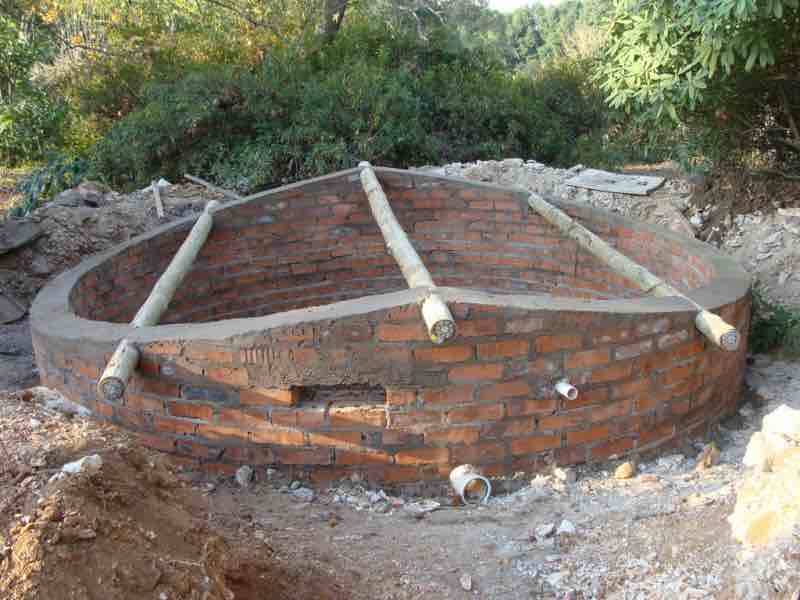
I have said it many times before; the real value of our green garden is our wonderful health. You probably have read the frightening report that within just 8 years, one third of all adults in SA will be obese; those who eat these kinds of foods will never have to fuss with dieting. Neither hunger, nor malnutrition will touch them.
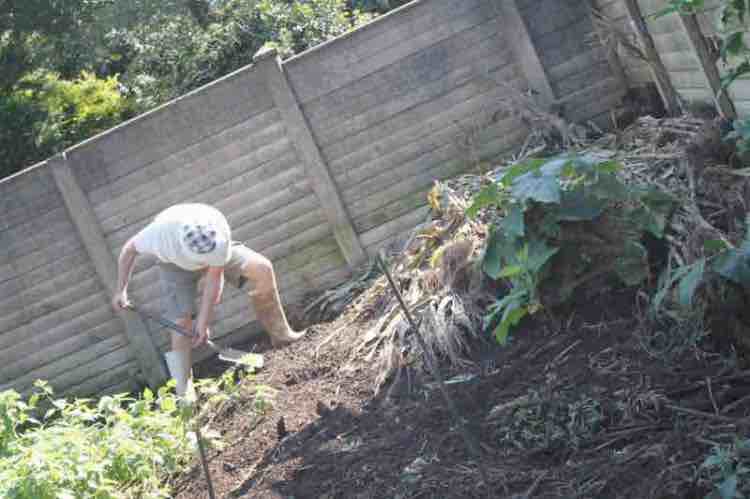 Gardening is hard work
Gardening is hard workDo I make it sound so easy? It’s not. We are two very committed gardeners who just love being healthy, taking no medication and having to consul doctors infrequently; mostly for skin lesions from too much time spent in the African sun. It is hard work digging out mealie stalks at the moment, building compost heaps and getting all the winter veg planted.
I would guess we spend at least three hours most days between us, though much of the good wife’s effort also goes to flowers. I know of no other man in the world who gets fresh roses every daily in his office.
It’s exercise, time out in the fresh air and a mountain of the best food in the world. I confess I have little truck with those who say they cannot afford to eat healthily. Mostly they are ignorant, lazy or both. There are obviously many exceptions; the elderly, disabled and infirm particularly.
Johanna Ralston, CEO of the World Federation has recently chided leaders in politics, public health and yes, the media too. She says it’s shocking how inadequate our response to the obesity pandemic has been. By and large we have chosen rather to be politically correct, look the other way or shoot the messenger, accusing them of fat-shaming.
Double-vaxxed I’ve just recovered from Covid. Three days in bed with a high temperature and little else. Those who enjoy this lifestyle having nothing to fear.
Food prices in South Africa
Food prices in South Africa are soaring but it's not rocket-science to grow a mountain of fruit and vegetables in a well organised garden.
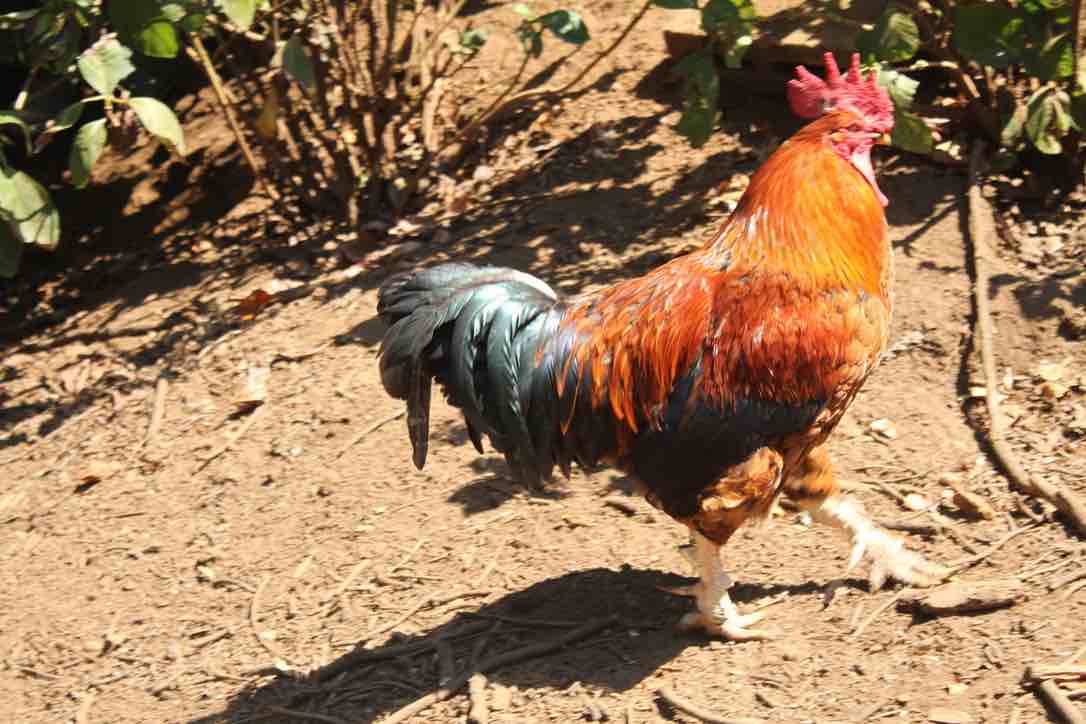
When browsing use right click and "Open Link in New Tab" or you may get a bad gateway signal.
The material expressed on this page is gleaned from the nutritional and environmental literature; it is clearly referenced. A plain distinction is made between the author's opinion and that which is scientifically proven. When in doubt consult your health professional.
To suggest a correction or clarification, write to Dr Bernard Preston here. Contact.
Newsletter
Our newsletter is entitled "create a cyan zone" at your home, preserving both yourself and Mother Earth for future generations; and the family too, of course. We promise not to spam you with daily emails promoting various products. You may get an occasional nudge to buy one of my books.
Here are the back issues.
- Lifestyle and ideal body weight
- What are ultra-processed foods?
- Investing in long-term health
- Diseases from plastic exposure
- Intensive lifestyle management for obesity has limited value
- A world largely devoid of Parkinson's Disease
- The impact of friendly bacteria in the tum on the prevention of cancer
- There's a hole in the bucket
- Everyone is talking about weight loss drugs
- Pull the sweet tooth
- If you suffer from heartburn plant a susu
- Refined maize meal and stunting
- Should agriculture and industry get priority for water and electricity?
- Nature is calling
- Mill your own flour
- Bake your own sourdough bread
- Microplastics from our water
- Alternative types of water storage
- Wear your clothes out
- Comfort foods
- Create a bee-friendly environment
- Go to bed slightly hungry
- Keep bees
- Blue zone folk are religious
- Reduce plastic waste
- Family is important
- What can go in compost?
- Grow broad beans for longevity
- Harvest and store sunshine
- Blue zone exercise
- Harvest and store your rainwater
- Create a cyan zone at your home
Did you find this page interesting? How about forwarding it to a friendly book or food junkie? Better still, a social media tick would help.
- Homepage
- Our green garden
- Food Prices in South Africa
Address:
56 Groenekloof Rd,
Hilton, KZN
South Africa
Website:
https://www.bernard-preston.com